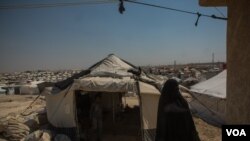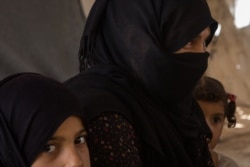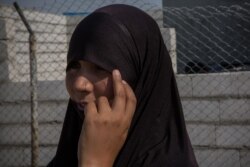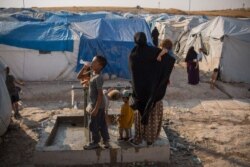Five years ago, Sara left her home in Iraq with her husband to join what was then, for many, a hopeful idea: a new country of the faithful, the Islamic State.
“There was no question that I should join,” says Sara, after placing a black veil over her face. “I am Muslim.”
In the years that followed, Sara enjoyed life under IS's rigid religious strictures, seemingly oblivious to the terror group's horrific actions elsewhere and comfortable among her like-minded neighbors in Iraq and later Syria.
But when Syrian and coalition forces started closing in on the group, she and her two sons were forced to flee airstrikes over and over again, finally surrendering six months ago in Baghuz, IS’s last stronghold.
Now she lives in a squalid camp in Syria, packed with women and children that some locals derisively call an “Islamic State camp.” Security officials warn that many of the women here were married to the most indoctrinated IS fighters, and that the residents are still living—and sometimes dying—by IS rules.
Sara says her husband was arrested after they fled the airstrikes that killed her two older sons in Baghuz, the town where IS lost their last sliver of land in March. She is not accused of a specific crime herself, but she is not free to leave the camp. Clean water and medical care are scarce, and hundreds of children have died here this year.
Some women here tell us vague and contradictory stories, claiming no allegiances to IS, a group best known to outsiders for draconian laws, brutal punishments and extreme public violence. But Sara speaks up for the militants, saying the “Caliphate” will return and grow stronger. IS violence, she claims, was a reaction to attacks and poor treatment.
“People say we have crazy suicide bombers,” she says, “but they are constantly hitting us with airstrikes. We have no choice.”
Repatriation
A week later, at Ain Issa, another camp that houses foreign IS wives in Syria , German, British, French, Belgian and Tunisian women crowd around us, hoping for a glimmer of news about their release.
There is little to tell, as Syrian forces and international organizations continue to call for countries to repatriate their citizens, and roughly 50 countries around the world continue to mostly ignore those calls.
Six months ago, as IS territory was defeated, thousands of foreign fighters, their wives and children were captured or surrendered. Young Western women in camps caught the attention of the media, and many of them made headlines. Since then, the headlines have become less frequent, less urgent and less likely to change their situations.
“There is not enough food or water and we barely see electricity,” says Umm Mariam, a French national of Tunisian origin, with bright eyes snapping behind her black full face veil. "Even living in a different Syrian camp could be an improvement."
France, she adds, was difficult for her, as well. “In France I was afraid to walk around in my veil,’ she explains. “People would shout, ‘Go back to your country!’ I was born in France. Where should I go back to?”
A few women plead their cases near the dusty entrance of the camp, saying they want to go to their countries, even if they have to face prison time. Bouchra Abouallal, from Belgium, has recently lost court petitions with her sister-in-law, Tatiana Wielandt, to send their six children back to Belgium.
The two women have publicly denounced the Islamic State several times, asking for their six children to be brought to Belgium, but their case was denied last spring.
“This camp is like like the Islamic State with a fence around it,” Aboualla says. “But it’s more difficult than the real Islamic State. At least there you can close the door.”
Extremism festers
Securing the closed camps of IS women has become increasingly difficult, according to intelligence officers, who operate the camps, mostly from outside the fences.
In the past month at al-Hol, six tents have been burned to the ground by the “Hisbah,” an IS-styled religious police presence that residents have created for themselves within the camp.
Four intelligence officers have been attacked, some with knives. A pregnant Tunisian woman and a 14-year-old girl also have been killed.
“Usually it is because she said something bad about [IS leader] Abu Bakar al-Baghdadi or they didn’t wear the veil on her face… or something like that,” explains an intelligence officer, a woman in her early 20s, who does not want to be named.
At a small shop in a tent a few hundred meters away from the al-Hol intelligence office, Sadia sells juices, candy and chips. Also from Iraq, Sadia moved deeper into IS-controlled areas during the battles as Iraqi and coalition forces took over Mosul more than two years ago.
Her face is not covered and she laughs when asked why. “I am an old lady,” she says. “Why would I need to?”
I start to ask if the Hisbah tries to make her wear a veil on her face. Upon hearing the word ‘Hisbah,’ she looks noticeably agitated and shoos a small boy off her lap.
At the Ain Issa camp, most women do not speak when asked if they must continue to conform to IS rules. They nod quietly, with some glancing around to see if anyone is listening.
One 21-year-old mother stands out, wearing trousers and smoking a cigarette. She is an IS bride-turned-intelligence officer, and she says she is loathed by the other women.
“Some women came up to me recently,” she says, twirling what looks like a slender, but powerful baton. “They say I don’t have long to live in this world.”














